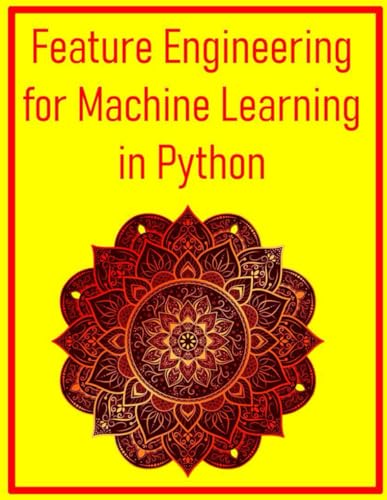Items related to Feature Engineering for Machine Learning in Python:...
Feature Engineering for Machine Learning in Python: A Practical Guide to Creating Data Features That Drive Model Performance Using Python and Scikit-Learn: Techniques, Pipelines, and Case Studies - Softcover

Synopsis
- Master the Foundations of Feature Engineering: Understand what features are, why they're crucial for machine learning model performance and interpretability, and navigate the complete feature engineering lifecycle from brainstorming to deployment.
Set Up Your Python Environment for Success: Become proficient with essential libraries like NumPy, Pandas, and Scikit-learn for data manipulation, analysis, and feature engineering implementation.
Handle Missing Data Effectively: Learn to identify and apply various imputation strategies for both numerical and categorical data, ensuring your models receive clean and complete inputs.
Transform Numerical Data for Optimal Performance: Discover techniques for scaling, normalizing, discretizing, and transforming skewed numerical features to meet model assumptions and improve accuracy.
Encode Categorical Data for Machine Learning Models: Explore a wide array of encoding methods, from One-Hot and Label Encoding to advanced techniques like Target and WoE Encoding, and understand when to apply each for different data types and models.
Engineer Powerful Features from Text Data: Master text preprocessing, apply Bag-of-Words and TF-IDF models, and leverage word embeddings (Word2Vec, GloVe) to extract meaningful insights from unstructured text.
Extract Actionable Insights from Time Series Data: Learn to create date-time components, lag features, rolling window statistics, and incorporate seasonality and trend information for robust time series modeling.
Gain an Overview of Feature Engineering for Specialized Data: Get introduced to key techniques for image, geospatial, and graph data, and understand how to leverage pre-trained models for feature extraction.
Select the Most Relevant Features: Implement various feature selection methods, including filter, wrapper, and embedded techniques, to reduce dimensionality, combat overfitting, and enhance model interpretability.
Apply Dimensionality Reduction Techniques: Understand and utilize methods like PCA, LDA, t-SNE, and UMAP to reduce the number of features while preserving essential information.
Automate and Streamline Feature Engineering Workflows: Explore tools like Featuretools and tsfresh to automate feature creation, saving time and improving efficiency.
Build Robust and Reproducible Feature Engineering Pipelines: Learn to construct and manage end-to-end pipelines using Scikit-learn, ensuring consistency and preventing data leakage.
Prevent Data Leakage and Build Trustworthy Models: Identify common sources of data leakage in feature engineering and implement strategies to avoid it, leading to more reliable model evaluations.
Understand Feature Stores and Their Role in MLOps: Grasp the concepts of feature stores for consistent feature management, reusability, and deployment in production environments.
Apply Feature Engineering to Real-World Problems: Work through practical case studies in customer churn prediction, sentiment analysis, and sales forecasting, consolidating your knowledge across different data types.
"synopsis" may belong to another edition of this title.
Buy New
View this item£ 7.33 shipping from U.S.A. to United Kingdom
Destination, rates & speedsSearch results for Feature Engineering for Machine Learning in Python:...
Feature Engineering for Machine Learning in Python: A Practical Guide to Creating Data Features That Drive Model Performance Using Python and Scikit-Learn: Techniques, Pipelines, and Case Studies
Print on DemandSeller: California Books, Miami, FL, U.S.A.
Condition: New. Print on Demand. Seller Inventory # I-9798290277059
Quantity: Over 20 available
